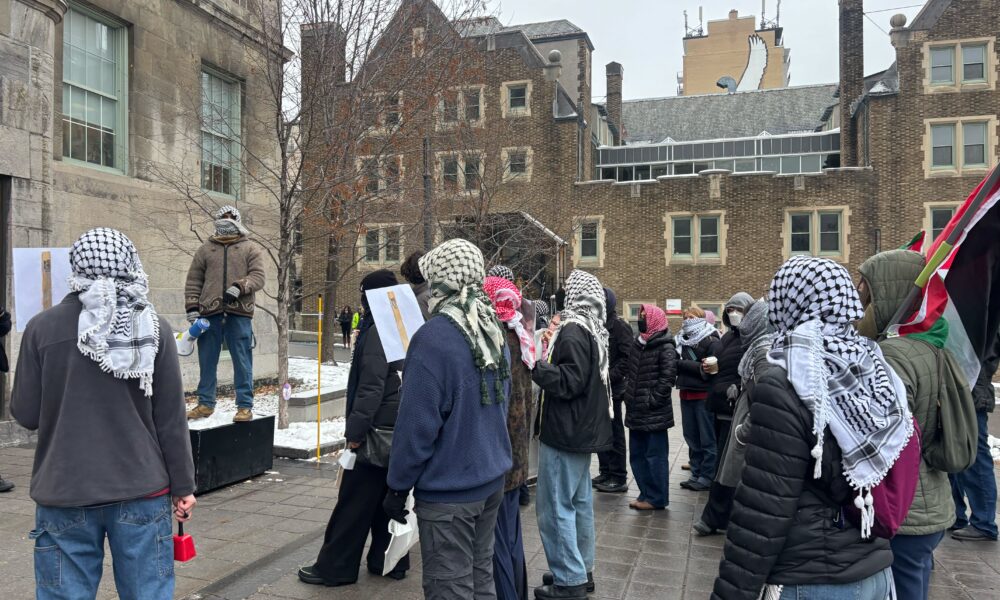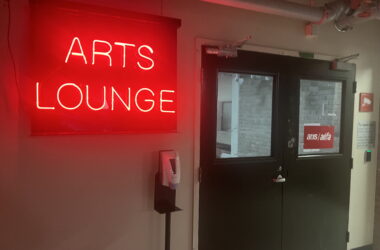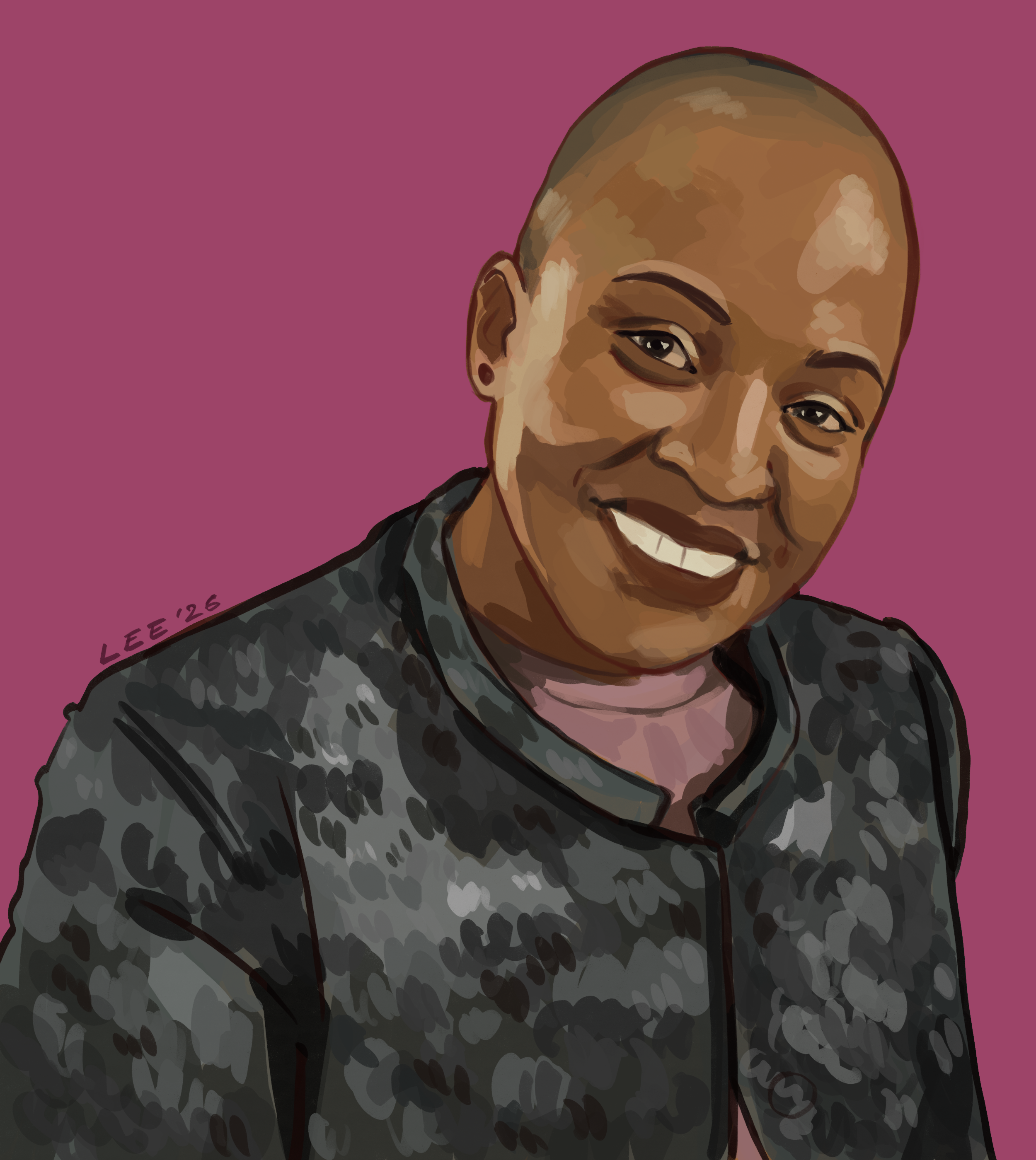From Nov. 17 to Nov. 21, 20 departments at McGill went on strike, calling for the university to divest from companies complicit in Israel’s genocide of Palestinians. These departmental strikes, organized by Divest McGill, Divest for Palestine, Working Alternatives McGill, and McGill Admin Watch, occurred alongside programming put together by the Shut It Down strike collective as well as student picketing. The Tribune brings you coverage of some of these programming events.
Wednesday, Nov. 19 – “Tyranny of Structurelessness” lecture
Barry Eidlin, associate professor in the Department of Sociology, gave a lecture titled “Tyranny of Structurelessness,” then led a discussion encouraging students to reflect on the current Boycott, Divestment, and Sanctions (BDS) movement for Palestine. A striking student in attendance made a connection between the present BDS movement and the Indian independence movement.
“Coming from India, our independence movement was supposedly non-violent, but at the end of the day, what led to independence was the fact that [many protests in India were] violent,” the student said. “It’s just extremely easy to ignore ‘perfect’ [non-disruptive] movements.”
Eidlin responded by agreeing that disruption is often the only way to truly make change in activist struggles.
“You do need to disrupt to win,” he stated. “The whole point of social movement is to shake things up. [Movements] emerge when existing channels, the proper channels, are not available. And the way that you create new channels, it’s a process of disruption.”
Another striking student expressed that the difficulty in mobilizing students to hold departmental strikes demonstrates a general student apathy towards the on-campus movement for Palestine, and reflects significant disparities in student representation at General Assemblies (GAs) where departments vote to strike.
“Quorum to vote on a strike for either a department or for the whole undergrad [represents] a very vocal minority that shows up, including myself,” they described. “Most people are not going [to their departmental GAs] because […] they don’t care enough to vote. So then we go on strike because 10 per cent of students have decided we should, but that’s still 90 per cent of students who don’t necessarily feel as passionately about it, and then are frustrated that we’ve gone on strike because a small group of us voted on it.”
The attendee highlighted that students—even those uninterested in striking—must continue to uphold democracy by participating in discussions about such departmental activist choices.
“[Students] should [still] show up [to GAs] if they don’t want to [strike]. They should show up and vote,” the attendee said. “That’s really […] why, even though we get these strikes passed and it feels successful, ultimately, it’s not really, because [most students] still want to go to class.”
More information on lecture content can be found here.
Thursday, Nov. 20 – Campus restrictions announced
At 6:17 p.m., the Emergency Operations Centre announced that students would need their student IDs to enter McGill buildings on Nov. 21.
Friday, Nov. 21 – Divestment rally
At 7:30 a.m., protesters gathered in front of the James Administration Building to demand McGill’s administration divest from companies complicit in Israel’s genocide in Palestine.
“It’s the [university’s] administrators that are refusing to have conversations with students, or if they do have conversations, they’re totally taken in bad faith,” a protester said in an interview with The Tribune. “So we came together early today to be able to shame administrators as they were coming into the building to show them that we’re always watching them. We’re always going to hold them accountable to the decisions they make. There’s no hiding from the students.”
At the beginning of the rally, five McGill security guards were standing outside the building. One was wearing a bright nylon vest and held a camcorder to scan the crowd. She was identified by one protester in an interview with The Tribune as a member of private security McGill hired in preparation for the strike who, at the beginning of the Shut It Down week, filmed students picketing while wearing civilian clothes instead of an identifiable security uniform.
In an interview with The Tribune, another protestor stated that the level of security McGill has employed during this strike is unparalleled to anything seen in the university’s history, with almost 30 guards at one point employed against ten students who were soft picketing.
“[Security guards] are the ones that are intimidating students on campus because they cause escalations,” the protestor said. “They’ve been filming students’ faces. They’ve been recording students’ voices. It’s like we live in a surveillance campus.”
In a written statement to The Tribune, McGill’s Media Relations Office (MRO) stated that the university deploys security to keep protest on campus peaceful.
“When groups choose to protest, University Security personnel are present to remind participants that vandalism, violence, and classroom obstruction are not tolerated, and that compliance with the Code of Student Conduct and Disciplinary Procedures is required to avoid sanctions,” the MRO wrote.
As the rally continued, approximately fifteen more security guards arrived, forming a complete perimeter around the protesters. One marched into the crowd with a camera to get close-ups of students’ eyes: The only identifiable feature left exposed for most in attendance. Still, not one protester left their post.
Organizers then poured red paint on the pavement in front of the James Administration Building and on their hands to demonstrate how students’ tuition may contribute to McGill’s investments in weapons companies such as Lockheed Martin and Airbus Aerospace. About 15 minutes after the rally ended at 9:00 a.m., McGill staff power-washed the paint away as security trailed departing protestors from rue Milton to av. Lorne.
In an interview with The Tribune, a third protester cited previous student activists’ success in pushing McGill to divest from businesses with connections to fossil fuels and South African apartheid, affirming their confidence in the current movement for divestment from Israel’s genocide.
“I’m sure that it’s going to take a long time for us to achieve divestment from weapons companies tied to the genocide in Palestine, but I really believe that we can do it, and I know that everyone else [here] believes in it too,” they stated. “And we need every single student on this campus to believe in it.”
Friday, Nov. 21 – “The Colonial University and its Opps” talk
A former McGill graduate student, who wished to remain anonymous, hosted a talk called “The Colonial University and its Opps,” on Nov. 21 at 1:00 p.m. in McGill’s Players’ Theatre. Their presentation covered a broad overview of McGill’s colonial entanglements and their implications for contemporary protests. The talk also explored the history of activism at McGill, focusing on how campus protests have evolved over time.
The speaker emphasized the role of McGill’s physical presence in the workings of the broader colonial apparatus. They argued that the institution’s buildings and land use are intertwined with global systems of power, rather than being neutral spaces of learning as McGill’s community might believe them to be.
“I really want to emphasize how [slavery and colonial extraction] are imbued into [McGill’s] buildings and their names,” the speaker stated. “For instance, the Strathcona Anatomy and Dentistry Building. The first Baron Strathcona was a British Empire elite. He made all his money through things like the Anglo-Persian Oil Company, which was key in the colonial encroachment on what is now Iran.”
The speaker then moved to a discussion of past student movements for justice, including the 1980s anti-South African apartheid divestment campaign at McGill. The speaker described this movement as an example of student activism that successfully forced administrative change at the university, but only after years of effort and moments of waning traction for the movement.
“McGill was the first place in Canada to divest [from South African apartheid], but it was not the first place in North America [to do so]. In fact, it was kind of late to the party,” the speaker stated. “A lot of Ivy League universities had already started to divest in the years immediately prior to 1985. Those successes were really mobilizing. People were excited. They felt like their goal was possible again. But those successes were only possible because the student movement at [that] point was pretty mature.”
The speaker then turned to facilitating discussion about more recent protest efforts at McGill. One attendee of the event questioned the effectiveness of the departmental strikes, contrasting them with the 2024 Palestine Solidarity Encampment. They argued that the encampment may have been a more impactful protest tactic, as it had no defined length; it was meant to persist indefinitely until student demands were met. In response, the speaker expressed that while unlimited strikes can be more effective at forcing action from the administration, they also require significantly more planning and coordination to carry out.
“One of the important things to understand about unlimited strikes is that they’re really hard. [They are] the product of years of organizing [students] to build […] capacity in the student movement, to build the democratic processes in the movement to be able to strike,” the speaker said. “A lot of students don’t understand strikes […] because they haven’t been equipped yet with the knowledge to create their own analyses of the situation, and be able to engage with [striking] in ways other than what McGill emails say.”








